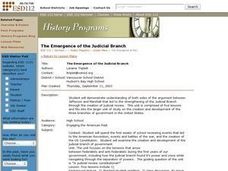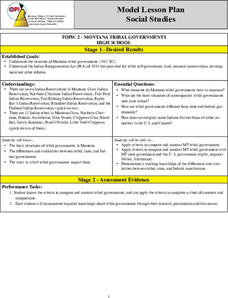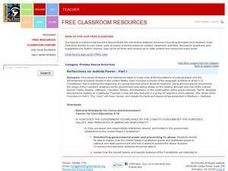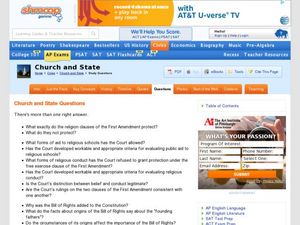Curated OER
Separation of Powers
Eighth graders explore and explain the responsibilities and limits of our national system of government. After reading various selections documenting the viewpoints of the federalists and anti-federalists and the separation of power,...
Curated OER
Judicial Review
Student demonstrate understanding of both sides of the argument between Jefferson and Marshall that led to the strengthening of the Judicial Branch through the creation of judicial review. Unit is comprised of five lessons and fits into...
Curated OER
Fourth Grade Social Studies
In this social studies worksheet, 4th graders complete multiple choice questions about the climate, landforms, regions, government, and more. Students complete 25 multiple choice questions.
Curated OER
U.S. Constitution - Checks and Balances
Students examine the separation of powers of the branches of the U.S. federal government. In this U.S. Constitution lesson, students listen to a SMART Board supported lecture on checks and balances of the Judicial, Legislative, and...
Curated OER
The Emergence of the Judicial Branch
Learners demonstrate understanding of both sides of the argument between Jefferson and Marshall that led to the strengthening of the Judicial Branch through the creation of judicial review.
Curated OER
Participation in Local and State Government
Students investigate the state and local levels of government. They demonstrate an examineing of government at these levels. The identification of officials and resources can be used for assessment.
Curated OER
Organization of Fairfax County Government
Middle schoolers identify Fairfax County government as council-manager government, describe term of office held by members of Board of Supervisors and districts they represent, how Chairman of Board of Supervisors is elected and term and...
Curated OER
Montana Tribal Governments
Students engage in a research lesson plan to find out more information about tribal governments. The lesson plan includes guiding questions to help in the research process. They complete a chart of comparisons and contrasts of several...
DocsTeach
Court Packing vs. Reorganizing: The Supreme Court in the New Deal
Travel back in time to understand the effects of FDR's New Deal on the Supreme Court. Academics analyze historical documents to understand FDR's attempts to pack the Supreme Court and the opposition he faced. The activity includes a...
Curated OER
Reflections on Judicial Power - Part I
Students research the Constitutional provision for the Judicial branch of government. They examine different U.S. founder's positions on the relative strength of the judicial branch and act as a review court for Marbury vs. Madison.
Curated OER
Can We Breathe Easier?
High schoolers list the exclusive and shared powers of the state and national governments. They state the specific role of the national and state governments in enforcing environmental legislation.
Curated OER
THE JUDICIAL BRANCH
Students create a series of drawings to show the process of how the Supreme Court does its work. The drawings may be in strip cartoon form or a series of separate illustrations.
Curated OER
Investigating the Judiciary Act of 1789
Students research the Judiciary Act of 1789 including why it was needed and what it provided. They write a paper using all steps of the writing process outlining their findings.
Carolina K-12
Sample Test: The Judicial System
From Marbury v. Madison and original jurisdiction to Gideon v. Wainwright and civil appeal, here is a simple and comprehensive assessment on the judicial system of the United States.
Curated OER
Full Court Press
Students investigate the Supreme Court's role and function in the federal government and examine how Chief Justice Rehnquist's illness might affect the future of the Court. They write letters to President Bush on the Supreme Court...
Curated OER
How the Supreme Court Affects the Lives of Teens
Students describe the structure and function of the United States Supreme Court. They examine and analyze decisions made by the Court. They participate in a debate about recent issues.
Curated OER
American Revolution and Constitution Take-Home Assessment
In this early American history worksheet, students draw diagrams of that feature the responsibilities of each of the 3 branches of the federal government and then create their own original visuals that highlight the formation of American...
Curated OER
Shifting Wins
Students analyze how the outcome of the 2002 midterm elections changed the balance of power in the government. They write a news analysis and evaluation of how the nation be governed in the future.
Heritage Foundation
Courts and Judges
If the Supreme Court is so supreme, why do all cases not just start there? High schoolers learn why every case does not start at the Supreme Court as well as the importance of hierarchy in the US judicial system in the 11th installment...
Curated OER
The Virginia Plan and the New Jersey Plan: Student Worksheet
These guided reading questions accompany several websites on the development of the US Constitution. While some of the links have changed, they are still accessible. History or government classes benefit from reading primary source...
Curated OER
An Introduction To Law
Students identify 4 branches of law-criminal, civil, consumer, and family. using a newspaper, they locate examples of how laws affect citizens on a daily basis.
Curated OER
Understanding by Design
Fourth graders examine the origins, structures, and functions of the Colorado government. In this understanding by design lesson, 4th graders explore the three branches of government. Students identify the roles of state leaders and the...
Curated OER
The Rule of Law
Young scholars examine the rule of law and government in this civics instructional activity. They discover the origins and how it impacts them on a daily basis. They also analyze its role in the judicial system.
Curated OER
Church and State Questions
In this U. S. government worksheet, learners respond to 17 short answer questions about the first amendment and the separation of church and state.

























